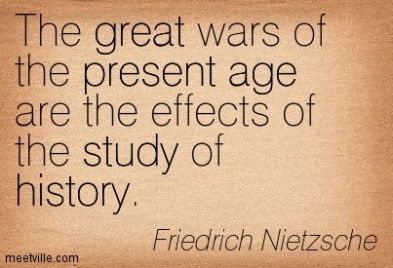
History, as defined by many dictionary/internet sources, seems to be defined precisely in a way that I believe Nietzsche would not condone; basically, they all define it clearly and distinctly as documentation of past events—a somewhat reductive approach if I (and Nietzsche) may say so. If one decides to explore the different definitions, as I did, one may notice that there is a lack of real purpose. In most of these definitions is embedded the idea that history is merely an objective (or attempt rather) look into the past. It is defined in a manner which deceivingly claims historical records as entirely factual and/or objective. A better definition, which I did not stumble upon, that I used to hear when I was studying history, is the one that sells it as not merely as a record of the past, rather as mean to understand the present, and prepare for a better future (supposedly). The latter which sells history as a purpose for life, rather than just a science, is one that I believe Nietzsche would be more inclined to accept.
Political philosophers, in order to substantiate their views, have appealed to history in several different ways. Hobbes notices that we have a history of brutality, and derives from it that we ought to have a government where ensuring peace/protection is the main priority. Locke decides that we are not so terrible; however, we have some sort of [less than pleasant] history with property, so he tailors an ideal government around that. The contemporary political philosophers, such as Rawls and Nozick, do likewise. From this trend I am tempted to deduce that the field of political philosophy appears closer to doing justice to history as Nietzsche would want it to be. That is, history without philosophy — without serious thought on causes, consequences, and possible actions, is the mere “objective” science that we ought to avoid. Indeed, this happened in 1492 and that happened in 1804 are meaningless without the “so-what” of it all. In other words, how does one move beyond history as simple trivia?
We could all learn something from Nietzsche’s musings on historiography. I support the critical way of studying history because otherwise I am committed to accept a burden of responsibility and freedom that I am not quite sure I want. To illustrate, I cannot perpetually blame history for the shortcomings of marginalized groups. However, I must recognize that it is an undeniable truth of nature that actions carry consequences. So, it is a meticulous look at history which will not allow me to stubbornly view affirmative action as WHOLLY unfair, for I believe that there are sound and valid arguments to be presented for retributive justice. On the flipside, within reason, I must accept Nietzsche’s idea of not going to the excess because then I live out individuals and their individual responsibility in the present — one simply cannot forever blame history for failures when flaws like laziness are attributes of individuals. The question, then, should be about where we set the limits.
Nietzsche also refers to the unhistorical person. I can see the merits and displeasures of being unhistorical even in my own life. Haitian adults, for the most part, do not really communicate with their children about their past and the family history. I, for one, have no idea what is buried in my own past; so I often stop, reflect, and suddenly feel rootless. This feeling of being rootless, which sometimes come as an existential angst, is a curiosity about my past, where I come from — alas, how did I get here? So, one of the displeasures could be that angst. However, it is this feeling of being rootless, that sometimes gives me the freedom and satisfaction of being able to shape myself into whatever I want, for I have no blueprint by which I have to abide. The world is my oyster and I can be my own person. I can continue to live and achieve without feeling like I am disappointing the past, my family’s past, my past. In that very sense, as Nietzsche seems to hope that it ought to be, I am going against history, and in an inevitable ironic twist, I am making history in the process. The latter alludes to the first and second nature of individuals of which Nietzsche spoke (feel free to ignore that reference if you are not quite the philosophy reader or aficionado and have no time for that).
Ultimately, knowing my history and not being obsessed with it has benefited me on personal level and on a social level. I can confidently say that it has made me more welcoming of the “Other” than the average person; it makes me more open and comfortable with people belonging to the different social categories—constructed or in essence. For example, I know slavery happened, but I cannot and do not, like many, forever revel in resentment, frustration, and self-pity in face of the evils and consequences of said historical occurrence. This is simply not me, and it is precisely where I detach myself, deliver myself from the past. This is not to tell people who have suffered from the past to just “get over it”, rather to do some clearing, and make space for the present and the happening future. Living by that philosophy may at times even bring me accusations like “Uncle Tom”, “self-loathing”, or “sell out”, but to that I sarcastically apologize for allowing a critical view of human history to enlighten me enough to not take ignorance stances and have kneejerk reactions to the most banal things.
One can either look at history (or society) as a snapshot to then simply take the image for what it is on the surface, or one can take the higher, wiser road and look at it as a complex picture in motion with patterns of all sorts. It is through a meticulous look at history that I find myself not excusing, but rather understanding racism (or perceived racism). I find that knowing historical facts, yet abstaining from cultivating a fully historical self, gives me ultra-perceptive powers (lol jk, I am probably so dumb). Why is it still common in this day and age for blacks and whites to be awkward around each other? Why are we still so alien to each other at times? Why are we still the “Other” to each other? Is it natural, is it a thing of humans, or does history have too firm a grasp on us at all times?
In effect, I find that what often impedes certain people from coming together is their obsession with what happened in history, yet not being brave enough to resist it, overcome their preconceived notions of each other, and change it all for the better. They embrace history too much, and do not go against it enough. And that is precisely why, at the end of the day, I do not feel so terrible about abandoning my roots and my history sometimes (or most times) , for that is what allows me to constantly live in the present and rebel, revolt, declaring war on history…even though that itself someday, after I past, will become history. The unhistorical element allows me to be in the open, to live in the open, to open my heart – making it receptive of all people, understanding of all experiences, forgiving and loving. Is this not, after all, what Jesus would want? If there is a God, I do not see his promise of Heaven being compatible with an obsessive regard for our history when in the end repentance can efface it all. But I digress (when do I not?) …

